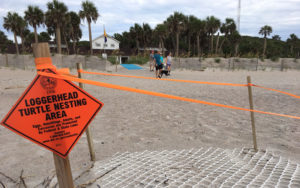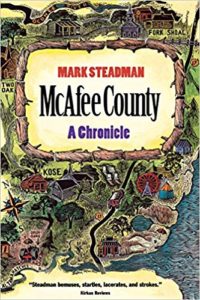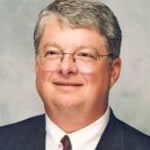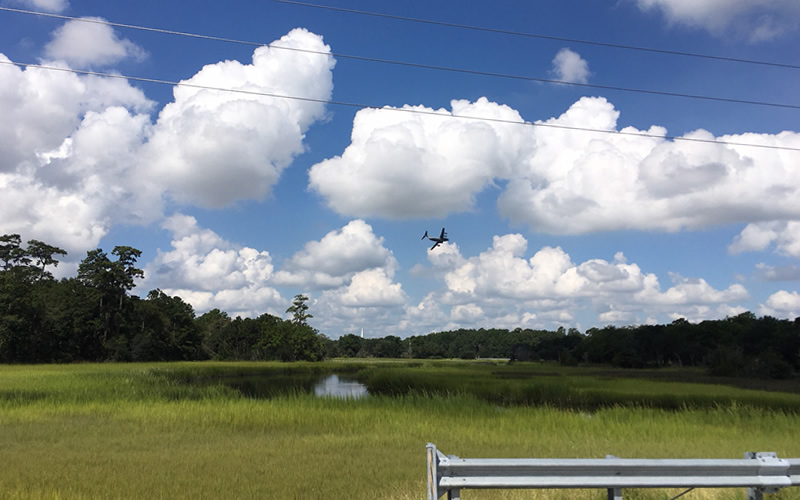 FOCUS, White: A local example of excellence and exceeding expectations
FOCUS, White: A local example of excellence and exceeding expectations
COMMENTARY, Brack: Democrats should lighten up, but GOP shouldn’t be tone-deaf
IN THE SPOTLIGHT: Magnolia Plantation and Gardens
PALMETTO POEM: Two works by Libby Bernardin
GOOD NEWS: Local governments have two groundbreakings
FEEDBACK: Former state senator gives two shout-outs on voting
MYSTERY PHOTO: Wild blue yonder
S.C. ENCYCLOPEDIA: Mark Steadman
CALENDAR: Don’t miss Black Ink on Saturday!
FOCUSFOCUS, White: A local example of excellence and exceeding expectations
By Craig White | I have a similar story [to Brack’s column on Joshie the Giraffe] involving the staff of Charleston Place.
My wife, two small children (ages 10 and 7) and I were visiting Charleston over a decade ago. At dinner the night before we were scheduled to head home to Greenwood, my wife started feeling very ill. We decided to get up early the following morning and get her home. As the night progressed, she grew much worse and was in terrible pain. We bundled the kids up and took her to MUSC’s emergency room. On the way out of Charleston Place, I told the front desk staff that I was taking my wife to the hospital and I would be back as soon as possible to pack and check out. They said not to worry about it and wished us well at the hospital.
At MUSC, we discovered that my wife’s appendix had ruptured, which required immediate emergency surgery. My children and I stayed at the hospital all day and, thankfully, the surgery was successful. Around 7 o’clock that evening, my two exhausted children and I returned to Charleston Place. When I went to the front desk, I expected our belongings were probably in storage and I thought we would have to find another hotel because my wife needed to be hospitalized for several additional days. When I gave the receptionist my name, his immediate response was, “Mr. White, how is your wife?”
This came from a staff member who was not at work there at 6 a.m., so the prior shift had fully communicated what had happened with my family. I explained the situation and he told me that our room was still ours for as long as we needed it and that we would receive a 50 percent discount off the normal room rate for any additional days. I was so grateful for the kindness.
We went to the room and I promised the kids we would go find something to eat. As soon as we entered the room, the phone rang. “Mr. White, how is your wife?” asked the room service staff person. I explained and thanked her for asking. She then informed me that the hotel would be sending dinner up to us at no charge and they even included an ice cream sundae bar for my children. Not only was the front desk aware of our situation, but the staff had communicated across the hotel.
This is the true essence of customer service. This experience happened years ago and I am fairly certain that most of the people who were so incredibly kind to my family and me are no longer with Charleston Place. I am sure you can guess what hotel I recommend to people going to Charleston and where I continue to stay when we go. I am still grateful to Charleston Place for its care and kindness during a stressful time—and always will be.
I have told this story countless times over the years to inspire people to focus on our patients and their families and to always strive to create the best experience.
Craig White is vice president and chief compliance officer of Self Regional Healthcare in Greenwood, where he and his family live. (He’s also a big fan of Statehouse Report!)
- Have a comment? Send to: editor@charlestoncurrents.com
BRACK: Democrats should lighten up, but GOP shouldn’t be tone-deaf
By Andy Brack, editor and publisher | If there ever were someone who understands how something said by a politician was “just a joke,” you’re reading a column by him.
You see, I once worked as the press secretary for former U.S. Sen. Fritz Hollings, an outstanding South Carolinian known far and wide for a great wit, biting and otherwise.
 Hollings’ aphorisms, fueled by a rich, Gullah-infused Lowcountry brogue, are legendary around Capitol Hill. Not only did people want to hear him talk just about any time, but they listened to the words he used. He’d highlight some government nonsense by noting “that sounds like the fireplug wetting the dog.” He blasted FEMA as “a bunch of bureaucratic jackasses.” Or he’d say someone was “full of prunes.” He would even turn the table on himself at campaign events, often comparing his mane of white hair to a Q-tip.
Hollings’ aphorisms, fueled by a rich, Gullah-infused Lowcountry brogue, are legendary around Capitol Hill. Not only did people want to hear him talk just about any time, but they listened to the words he used. He’d highlight some government nonsense by noting “that sounds like the fireplug wetting the dog.” He blasted FEMA as “a bunch of bureaucratic jackasses.” Or he’d say someone was “full of prunes.” He would even turn the table on himself at campaign events, often comparing his mane of white hair to a Q-tip.
In 1992, Hollings got the attention of Japan after its parliament speaker criticized the productivity of American workers. At a Hartsville roller-bearing plant, Hollings told about 90 workers, “I’ll take my editorial cartoon pen and draw a mushroom cloud and put under it ‘Made in America by lazy and illiterate Americans and tested in Japan.’” He later defended the joke as standing up against America-bashing.
So when some Democrats recently squawked about how Gov. Henry McMaster compared them to dogs, the whole political joke explanation wasn’t that unexpected.
“Our Democratic friends are a lot like dogs,” McMaster said Aug. 27 to a crowd of more than 1,000 at an Anderson barbecue. “One on one, they’re really nice, but in a pack they’re dangerous.”
The crowd laughed, which is something they’ve reportedly been doing for years when McMaster delivered the same line.
“It was a joke,” said Trey Walker, McMaster’s chief of staff. “Nothing more or less. It’s been done for 15 years, over and over again. It’s a joke. It’s funny. It gets a laugh every time he does it. Humor plays a very large role in politics, especially in political rallies and stump events.”
And McMaster should know, since he was the target of one of Hollings’ most famous quips, as Walker remembered:
“Henry McMaster has been the butt of one of the best jokes in politics in a debate in 1986 when then-candidate McMaster challenged Senator Hollings to take a drug test and when Hollings replied he’d be happy to do so whenever Henry would take an IQ test.”
So, yeah, let’s accept that the Anderson dog comment was a joke. Democrats need to lighten up.
But that’s not to let McMaster off the hook completely because the political atmosphere in America is different from what it was 15 or 20 years ago, particularly when a sitting president routinely dehumanizes enemies by insulting them as dogs.
Donald Trump’s reality-show television protégé, former White House staffer Omarosa Manigault-Newman, broke up the dull political days of a hot August with a new tell-all book full of gossip about turmoil and drama in the White House.
Trump, the incessant tweeter who gives but can’t take criticism, responded by calling her a “crazed, crying lowlife” and praised his chief of staff for “quickly firing that dog.” And that got under a lot of people’s skin, particularly since Manigault-Newman, who is black, was the highest-ranking African American to serve in Trump’s White House.
“Mr. President, it is beneath you and the office of the presidency to call any woman a dog,” tweeted a frequent Trump critic, Rep. Elijah Cummings, D-Md. “It is degrading and demeaning, and I pray that you will stop this vulgar behavior. Our country is better than this.”
So just as Democrats need to lighten up about the governor’s comment, maybe the governor needs to rethink telling a joke about dogs in light of the current political environment when the word “dog” has a different connotation and reference point this summer than it did last.
Yes, humor is a great way in politics to connect to voters. Let’s just make sure it isn’t sour.
- Have a comment? Send to: editor@charlestoncurrents.com
SPOTLIGHT: Magnolia Plantation and Gardens
 The public spiritedness of our underwriters allows us to bring Charleston Currents to you at no cost. Today we shine our spotlight on Magnolia Plantation and Gardens, founded in 1676 by the Drayton family. It has survived the centuries and witnessed the history of our nation unfold before it from the American Revolution through the Civil War and beyond. It is the oldest public tourist site in the Lowcountry and the oldest public gardens in America, opening its doors to visitors in 1870. Open 365 days a year, Magnolia offers its visitors splendid tours of nature and history and the role African-Americans played in the development of its award-winning Romantic-style gardens.
The public spiritedness of our underwriters allows us to bring Charleston Currents to you at no cost. Today we shine our spotlight on Magnolia Plantation and Gardens, founded in 1676 by the Drayton family. It has survived the centuries and witnessed the history of our nation unfold before it from the American Revolution through the Civil War and beyond. It is the oldest public tourist site in the Lowcountry and the oldest public gardens in America, opening its doors to visitors in 1870. Open 365 days a year, Magnolia offers its visitors splendid tours of nature and history and the role African-Americans played in the development of its award-winning Romantic-style gardens.
- Visit magnoliaplantation.comto learn how you can experience a complete plantation experience.
- Click here to learn about events and what’s new.
POEMS: Two works by Libby Bernardin
On Waking With Anxiety
By Libby Bernardin
The Pacific could belch up a tsunami
churned from the sea’s floor
a roar of sucking air pulls water back
as it meets shore—
you could be caught unaware
by this wave on its way
to pound a village to bits
you rowing frantically away from it
worse than my ten-year-old
self trying to run from the mad dog
when he dug his teeth into my heel,
followed by three weeks of daily shots
in my stomach, the twenty-first
the only time I cried—
but clearly, we don’t have a tsunami today,
even the bay is calm, a boat sails
leisurely on the inland waterway—
relax, eat a hamburger at the Marina,
bow to ineluctable fate,
ask what you will of sea.
Nothing to it
By Libby Bernardin
Nothing to it,
forgetting yesterday:
I blow it like kisses to past phantoms
what could it want from me?
I close my eyes and squeeze my lips
to what comes creeping in a moment’s
lapsed contemplation—
I won’t take back all that burned
swiftly as paper—let the flame shimmer
unshackled, a dalliance, nothing more.
Libby Bernardin’s first full collection is Stones Ripe for Sowing (Press 53, 2018). She has two chapbooks, The Book of Myth (SC Poetry Initiative, 2009) and Layers of Song (Finishing Line Press, 2011). Poems have appeared in numerous journals. In 2015, she won the SC Poetry Society Forum Prize. Her Poem “Transmigration” winner of the NC Poetry of Witness Award published in Pinesong, was nominated for a 2017 Pushcart Prize. She lives in Georgetown and is a Life Member of the Board of Governors of the South Carolina Academy of Authors.
- Have a comment? Send to: editor@charlestoncurrents.com
GOOD NEWS: Local governments have two groundbreakings
Staff reports | There must have been something in the water last week to bring on two groundbreakings.
![]() On Aug. 30, county park officials broke ground on a new public pool that will be built near the new Hollywood Town Center off S.C. Highway 165. The $3 million complex, which will include a 25-yard pool, is expected to open in the spring of 2019.
On Aug. 30, county park officials broke ground on a new public pool that will be built near the new Hollywood Town Center off S.C. Highway 165. The $3 million complex, which will include a 25-yard pool, is expected to open in the spring of 2019.
“Drowning is a real problem in the rural communities of Charleston County, and access to public pools in these areas is mostly nonexistent,” said Charleston County Park and Recreation Commission Executive Director David Bennett. “Bringing swimming instruction directly to these areas is a big step towards preventing drowning. The town of Hollywood is the perfect location to build our first pool, and we are thrilled to soon be able to offer these residents the opportunity to learn to swim.”
The following day, Charleston officials broke ground for a new West Ashley Fire Station adjacent to the Charleston Nine Memorial site on Savannah Highway.
“The building was beautifully designed by Liollio Architects and will be our largest, most modern, and well equipped station West of the Ashley and yet another milestone for West Ashley Revitalization,” Charleston Mayor John Tecklenburg said
WHAT WE LOVETell us what you love about the Lowcountry
Send a short comment – 100 words to 150 words – that describes something you really enjoy about the Lowcountry. It can be big or small. It can be a place, a thing or something you see. It might the bakery where you get a morning croissant or a business or government entity doing a good job. We’ll highlight your entry in a coming issue of Charleston Currents. We look forward to hearing from you.
FEEDBACKFormer senator has shout and shout-out on voting machines
To the editor:
![]() Both a shout and shout out about your article on voting machines.
Both a shout and shout out about your article on voting machines.
First the shout:
The machines are not only past their life, but they arguably don’t work — but it’s impossible to know since the software is proprietary and opaque. Voters have no real way of knowing that their votes are counted correctly nor does the state Election Commission. These machines are only used in five states because others have decertified them.
And there have be egregious errors when circumstances made it easy to see it. Case in point: A congressional special election in the Tampa area in 2009. Just two people were on the ballot. No other issues or names, period. 750 signed into one precinct. Only 600 votes were tallied. (The number is not precise, however is the correct order of magnitude.) ES&S, the vendor for the machines, said that the 150-ish votes not tallied represented people who came to vote, waited in line . . . and when they got in the booth, just decided they would not vote for either candidate. Really?
These machines can be hacked with little investment, little if any specialized equipment and not great expertise at the individual machine level, the precinct level or beyond. This is what has been stated in numerous technical studies of these machines done here in the state and elsewhere.
The cost estimate by [Election Commission Executive Director Marci] Andino is based on her advocating high-tech machines again. She was wrong before in the early 2000s. Optical-scan machines can be had for less and are simpler and more dependable with far less maintenance which is foisted on the counties. The state could avoid spending millions and the counties will avoid very expensive maintenance contracts that accompanied the IVotronic machines.
Due to the short period prior to the elections, the state could rent some optical-scan machines and make a decision later.
Second, the Shout out goes to you for bringing the subject to the attention of so many.
— Phil Leventis, Sumter, S.C. Leventis, a Democrat, represented the Sumter area in the state Senate for more than 30 years.
Send us a letter: We love hearing from readers. Comments are limited to 250 words or less. Please include your name and contact information. Send your letters to: editor@charlestoncurrents.com. | Read our feedback policy.
MYSTERYMYSTERY PHOTO: Wild blue yonder
This photo is in Charlston County, but it might not be where you expect it to be. There’s a big clue in the middle of it, but where is it? Send your guess to: editor@charlestoncurrents.com. And don’t forget to include your name and the town in which you live.
Our previous Mystery Photo
 The Aug. 27 mystery had a big clue at the left of the picture with a sign that said, “Loggerhead turtle area.” But which one? Folly Beach? St. Helena Island? Nope. It was, as a couple of sleuths figured out, the beach at Edisto Island State Park near a park building that overlooks the dunes..
The Aug. 27 mystery had a big clue at the left of the picture with a sign that said, “Loggerhead turtle area.” But which one? Folly Beach? St. Helena Island? Nope. It was, as a couple of sleuths figured out, the beach at Edisto Island State Park near a park building that overlooks the dunes..
Congratulations to this week’s super sleuths: Chris Brooks of Mount Pleasant and George Graf of Palmyra, Va. This was a tough one. Good job!
- Send us a mystery: If you have a photo that you believe will stump readers, send it along (but make sure to tell us what it is because it may stump us too!) Send it along to editor@charlestoncurrents.com.
HISTORY: Novelist Mark Steadman
S.C. Encyclopedia | Novelist Mark Novelist. Steadman was born in Statesboro, Georgia, on July 2, 1930, the son of Mark Sidney Steadman, Sr., an engineer with the highway department, and Marie Hopkins. The family lived in Decatur from 1940 until 1947. After his father died, Steadman moved with his family to Savannah, where they had kin. He attended Armstrong Junior College (A.A., 1949) and Emory University (B.A. in English, 1951). He married Joan Anderson, a school librarian, on March 29, 1952. They have three sons: Clayton, Todd, and Wade.
 Steadman served in the U.S. Navy as a naval air cadet from 1951 to 1953. From June 1953 he worked as a copywriter for the publishing company W. R. C. Smith in Atlanta. He then went back to school, at Florida State University (M.A. in English, 1956). In July 1957 he took a job as an instructor at Clemson College, and since then his life has been centered in rural Pickens County. He received his Ph.D. from Florida State University in 1963 for a thesis on “Modern American Humor.” The subject reflects his permanent preoccupation.
Steadman served in the U.S. Navy as a naval air cadet from 1951 to 1953. From June 1953 he worked as a copywriter for the publishing company W. R. C. Smith in Atlanta. He then went back to school, at Florida State University (M.A. in English, 1956). In July 1957 he took a job as an instructor at Clemson College, and since then his life has been centered in rural Pickens County. He received his Ph.D. from Florida State University in 1963 for a thesis on “Modern American Humor.” The subject reflects his permanent preoccupation.
Steadman taught humor and the American novel at Clemson for forty years. From 1980 until 1997 he was also writer in residence there. In 1968 he took a year’s leave of absence and accepted a position as visiting professor at the American University in Cairo, Egypt, where he “found his voice” as a writer of fiction. By the time he left Cairo in June 1969 he had written six stories, and back in South Carolina he added seven more. They were published in 1971 as McAfee County: A Chronicle. It is set in an imaginary coastal county with a population of 6,254, fifty-eight percent of whom are African American. The county serves as a microcosm of a southern coastal city around 1960. With a Gothic sense of the comic and with much compassion, Steadman shows the grotesqueness in most lives. The book did well and was brought out in British, French, and German editions.
In 1976 A Lion’s Share was published. The novel is about the greatest southern high school football player of all time. But we see more than his triumph; we also witness the hero’s tragic failure in college, in his job, and in his marriage. As William Koon put it, Steadman “moves from comedy to genuine tragedy” in this novel. The book was not a public or critical success, and Steadman came to regret that he had not made the football part of it a separate novel. So fourteen years later he rewrote the funny and nostalgic part and published it as Bang-Up Season.
In 1983 Steadman was Fulbright lecturer at Leningrad State University and began work on his third novel, which became Angel Child (1987). It is a hilarious story about Langston James’s “misformative years,” but it is also about a grotesque-looking young southerner’s dreams and troubled longing. In 1991 Steadman wrote the entry on “Humor” in the Encyclopedia of Southern Culture. Since leaving Clemson in 1997, he has been working on some “autobiographical fiction” and enjoying his retirement in Pickens County. He was inducted into the South Carolina Academy of Authors in 2002.
— Excerpted from an entry by Jan Nordby Gretlund. To read more about this or 2,000 other entries about South Carolina, check out The South Carolina Encyclopedia, published in 2006 by USC Press. (Information used by permission.)
ON THE CALENDARCALENDAR: Don’t miss Black Ink this Saturday
Staff reports | Nationally-recognized author Terry McMillan will be keynote speaker 2 p.m. Saturday at the day-long Black Ink Festival that celebrates African-American books and support local writers
 The free event, which runs from 11 a.m. to 5 p.m. Sept. 8, will connect readers with more than 50 authors at the main branch of Charleston County Public Library, 68 Calhoun St., Charleston.
The free event, which runs from 11 a.m. to 5 p.m. Sept. 8, will connect readers with more than 50 authors at the main branch of Charleston County Public Library, 68 Calhoun St., Charleston.
There are lots of activities and fun at this free festival, supported in party by Charleston Currents. More info via the Charleston Friends of the Library.
Also on the Calendar:
School board candidate forum: 6:30 p.m. to 8:30 p.m., International Longshoreman’s Hall, 1142 Morrison Drive, Charleston. Become an informed voter! Meet the folks who hope to add fresh leadership to the Charleston County school board. This is a panel discussion, featuring non-incumbent candidates for Charleston County School District Consolidated School Board. The event will be moderated by Michal Higdon. Free and open to the public.
Mamma Mia! Month-long run at Charleston Stage ends Sept. 23, Dock Street Theatre, Charleston. The popular musical is the opening show of the 41st season of Charleston Stage. The show runs through Sept. 23 at a variety of times with tickets ranging from $33.75 to $70.75. Click here for tickets and more info.
Wine Down Wednesday: 5 p.m. to 7 p.m., Sept. 5 and Sept. 19, Old Town Creek County Park, West Ashley. Explore Old Towne Creek County Park, one of West Ashley’s hidden gems, during the second of this four-part springtime event series. Guests will enjoy wine, live music from Shane Clark, and food truck fare from Tamashii. Wine and a commemorative glass are included with admission. Food truck fare is a separate fee. For more information, visit CharlestonCountyParks.com. Fee: $20, or $15 in advance.
Gaillard president to speak: Noon, Sept 6, Halls Signature Events, 5 Faber Street, Charleston. Steve Bedard, president and CEO of the Gaillard Management Corporation, will offer thoughts about the $145 million transformation of the Charleston Gaillard Center and the world-renowned entertainers it offers the Lowcountry. Bedard, named the city of Charleston’s first chief financial officer in 1998, is a 1976 graduate of the U.S. Naval Academy and has a master’s degree in business administration from the University of Georgia. Doors open for the luncheon at 11:30 a.m. Tickets are $31. Click here for tickets and more info.
Shaggin’ finale: Gates open 7 p.m., Sept. 8, Mount Pleasant Pier, Mount Pleasant. The season finale of Shaggin’ on the Cooper will feature live music by the Recollections and shag dancing. Advance tickets to Shaggin’ on the Cooper are $8 per person. Space is limited, so advance purchase is recommended. If available, tickets sold on site are $10. To purchase tickets, visit CharlestonCountyParks.com or call 843-795-4386.
Dooley garden lecture: 6:30 p.m., Sept. 10, Charleston Museum, 360 Meeting St., Charleston. Retired University of Georgia football coach Vince Dooley will offer a lecture on gardening to kick off Charleston Horticulture Society’s fall lecture series. Dooley, author of a book on gardening, will sign copies before the talk. Cost: $10 at the door; free to society members.
Shared racial history: 6 p.m. Sept. 20, Burke High School, Charleston, Deputy ACLU Legal Director Jeffrey Robinson will deliver a talk about the country’s shared racial history and how to unite America as a nation. Robinson also is director of the Trone Center for Justice and Equality, a project focusing on criminal justice reform. More.
ACLU SC celebrates 50. 6:30 p.m. to 9:30 p.m., Sept. 27, Republic Garden & Lounge on King Street, Charleston. The South Carolina office of the ACLU will hold an anniversary celebration with a keynote speech from Faiz Shakir, national political director of the ACLU. He is expected to provide updates on national community engagement efforts. More.
PSC ratepayer public hearing: 6 p.m., Oct. 15, Lonnie Hamilton III Public Services Building, 4045 Bridgeview Drive, North Charleston. The S.C. Public Service Commission hold a hearing for South Carolina Electric & Gas customers to air grievances over nuclear surcharge rates. More about the meeting.
Early morning bird walks at Caw Caw: 8:30 a.m. every Wednesday and Saturday, Caw Caw Interpretive Center, Ravenel. You can learn about habitats and birds, butterflies and other organisms in this two-hour session. Registration not required, but participants are to be 15 and up. $10 per person or free to Gold Pass holders. More: http://www.CharlestonCountyParks.com.
AREA FARMERS MARKETS
SATURDAYS: The Charleston Farmers Market, is back in action from 8 a.m. to 2 p.m. every Saturday through Nov. 24 at Marion Square. A holiday market will be open Dec. 1, 2, 8. 9, 15 and 16.
SATURDAYS: Johns Island Farmers Market operates each Saturday from 9:30 a.m. to 1:30 p.m. year-round with more than 50 local farmers and vendors, food trucks, music and more. The market is located on the campus of Charleston Collegiate School, 2024 Academy Road, Johns Island.
SATURDAYS: The Town Market on James Island are again open. Open 9 a.m. to 1 p.m. every Saturday at the James Island Youth Soccer Club, 871 Fort Johnson Road, James Island.
TUESDAYS: The Town of Mount Pleasant’s Farmers Market is every Tuesday from 3:30 p.m. to 7 p.m. in the market pavilion at Moultrie Middle School, 645 Coleman Blvd, in Mount Pleasant.
WEDNESDAYS. The West Ashley Farmers Market, 55 Sycamore Ave., is open every Wednesday from 3 p.m. to 7 p.m. in Ackerman Park. More.
- If you have an event to list on our calendar, please send it to charlestoncurrents@gmail.com for consideration. The calendar is updated weekly on Mondays.
If you like what you’ve been reading, how about considering a contribution so that we can continue to providing you with good news about Charleston and the Lowcountry. Interested? Just click the image below.
ABOUT CHARLESTON CURRENTS
OUR UNDERWRITERS
Charleston Currents is an underwriter-supported weekly online journal of good news about the Charleston area and Lowcountry of South Carolina.
- Meet our underwriters
- To learn more about how your organization or business can benefit, click here to contact us. Or give us a holler on the phone at: 843.670.3996.
OUR TEAM
Charleston Currents offers insightful community comment and good news on events each week. It cuts through the information clutter to offer the best of what’s happening locally.
- Mailing address: O. Box. 22261 | Charleston, SC 29413
- Phone: 670.3996
Charleston Currents is provided to you weekly by:
- Editor and publisher: Andy Brack, 843.670.3996
- Contributing photographer: Michael Kaynard
- Contributing editor, common good, Fred Palm
- Contributing editor, money: Kyra Morris
- Contributing editor, Palmetto Poem: Marjory Wentworth
SUBSCRIBE FOR FREE
Subscriptions to Charleston Currents are free.
- Unsubscribe. We don’t want to lose you as a reader of Charleston Currents, but if you must unsubscribe, you will have to do it through the email edition you receive. Just go to the bottom of any of your weekly newsletters and click the “unsubscribe” function. If that doesn’t work, please send us an email with the word “unsubscribe” in the subject line.
© 2008-2018, Statehouse Report, LLC. All rights reserved. Charleston Currents is published every Monday by Statehouse Report LLC, PO Box 22261, Charleston, SC 29413.








 We Can Do Better, South Carolina!
We Can Do Better, South Carolina!
























